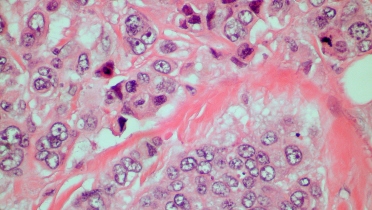Sacituzumab Govitecan Improves OS in Endocrine-Resistant Metastatic Breast Cancer
Compared to chemotherapy, the antibody-drug conjugate sacituzumab govitecan significantly improved overall survival (OS) for patients with endocrine-resistant, HR-positive, HER2-negative metastatic breast cancer, according to phase 3 study results from The Lancet.
The TROPiCS-02 study data showed that treatment with sacituzumab govitecan was associated with significant progression-free survival improvements for heavily pretreated patients with metastatic breast cancer.
Endocrine-resistant patients were randomly assigned to sacituzumab govitecan or to chemotherapy after treatment with at least one prior endocrine therapy, taxane therapy, and a CDK4/6 inhibitor, in addition to at least two previous chemotherapy lines for metastatic disease.
OS served as a key secondary endpoint in the study. The researchers reported data from 543 patients (sacituzumab govitecan, n = 272; chemotherapy, n = 271).
Assignment to sacituzumab govitecan correlated with a 3.2-month improvement in OS. With a median follow-up of 12.5 months (interquartile range, 5.4-18.8), patients in the sacituzumab govitecan arm achieved a median OS of 14.4 months, compared to 11.2 months for patients in the chemotherapy arm (hazard ratio [HR] = 0.79; 95% CI, 0.65-0.96; P = .02).
The benefits of treatment with sacituzumab govitecan extended to patients in all prespecified subgroups, including those treated with three or more previous chemotherapy regimens in the metastatic setting; patients with visceral metastasis; and patients treated with endocrine therapy in the metastatic setting for 6 months or more. Sacituzumab govitecan was further associated with robust outcomes regardless of the trophoblast cell-surface antigen 2 expression.
Patients assigned to sacituzumab govitecan also achieved a superior objective response rate (21% vs 14%; odds ratio = 1.63; 95% CI, 1.03-2.56; P = .035) as well as a longer interval before the deterioration of global health status and quality of life (median, 4.3 months vs 3 months; HR = 0.75; 95% CI, 0.61-0.92; P = .0059). Sacituzumab govitecan was also associated with a longer time to fatigue (median, 2.2 months vs 1.4 months; HR = 0.73; 95% CI, 0.6-0.89; P = .0021).
The researchers observed no new safety signals for sacituzumab govitecan, which was associated with a longer median treatment duration than chemotherapy (4.1 months vs 2.3 months). Six patients assigned to sacituzumab govitecan experienced fatal adverse events. One case of septic shock caused by neutropenic colitis was deemed related to treatment.
“Combined with delayed deterioration in quality of life and a manageable safety profile consistent with previous reports, these efficacy findings indicate that sacituzumab govitecan is an important novel therapy for [patients with endocrine-resistant metastatic breast cancer].”
- Hope S. Rugo, MD, FASCO, from the department of medicine, University of California, San Francisco, and the Helen Diller Family Comprehensive Cancer Center.
References:
https://www.thelancet.com/journals/lancet/article/PIIS0140-6736(23)01245-X/fulltext
https://classic.clinicaltrials.gov/ct2/show/NCT03901339
Disclosures: Rugo declared financial ties to drugmakers. See full study for details. TROPiCS-02 is being supported by Gilead Sciences.
Photo Credit: Getty Images.















.jpg)
.jpg)
.jpg)
.jpg)
.jpg)
.jpg)
.jpg)
.jpg)
.jpg)
.jpg)

.jpg)
.jpg)

.jpg)

.jpg)

.jpg)
.jpg)
.jpg)
.jpg)
.jpg)
.jpg)
.jpg)
.jpg)



.jpg)
.jpg)
.jpg)
.jpg)

.jpg)
.jpg)

.jpg)
.jpg)
.jpg)
.jpg)
.jpg)
.jpg)
.jpg)
.jpg)
.jpg)
.jpg)


.jpg)
.jpg)
.jpg)
.jpg)
.jpg)
.jpg)
.jpg)
.jpg)

.jpg)
_.jpg)
.jpg)
.jpg)
.jpg)
.jpg)

.jpg)
.jpg)
.jpg)


.jpg)

.jpg)

.jpg)


.jpg)

.jpg)
.jpg)

.jpg)
.jpg)

.jpg)
.jpg)
.jpg)

.jpg)
.jpg)

.jpg)



.jpg)
.jpg)

.jpg)
.jpg)
.jpg)
.jpg)

.jpg)

.jpg)

.jpg)

.jpg)
.jpg)
.jpg)
 Featured Breast Cancer Videos
Featured Breast Cancer Videos.jpg)